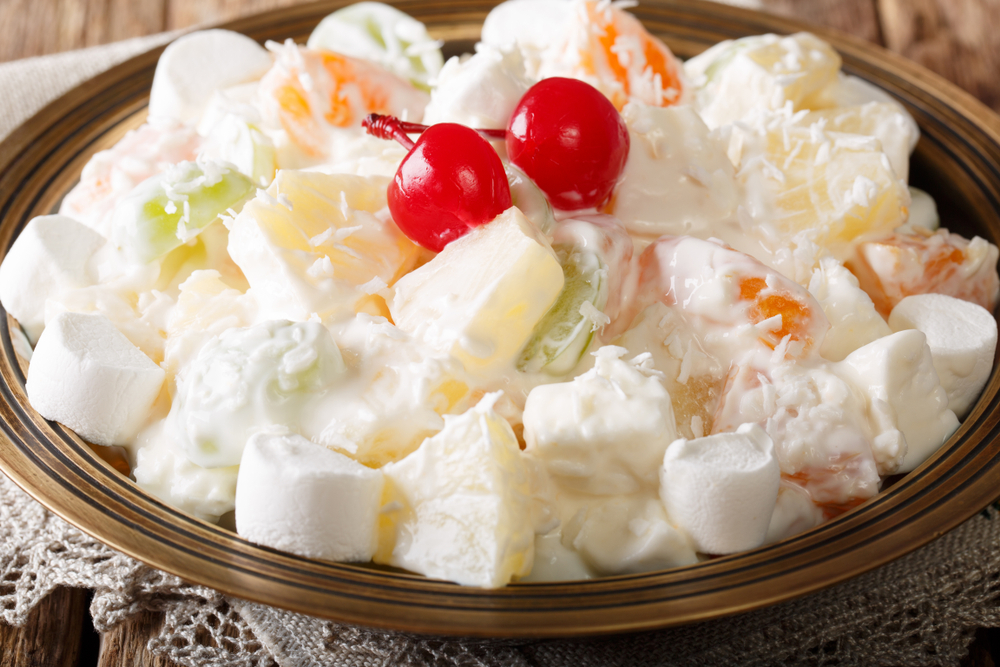
Everywhere one looks, advertisers are touting the next major superfood breakthroughs. While many items with the “superfood” label are packed with nutritional benefits, some consume them in the hope to stave off aging and live longer. Modern science hasn’t figured out a way to help us live forever, but our ancestors believed that some foods and drinks had supernatural capabilities. These magical sources of nourishment, divine edibles if you will, have a prominent place in belief systems from around the world.
Ambrosia: Feast of the Gods, Forbidden for Mortals
When you hear the word “ambrosia,” you probably picture a creamy fruit and marshmallow concoction that’s a staple at many potlucks and picnics. But the name is derived directly from old Hellenic religions and myths. Multiple ancient authors tried to describe ambrosia; it was described as both a food and a beverage. Occasionally, these writers also mentioned nectar being served on Mount Olympus. Sometimes “ambrosia” and “nectar” were used interchangeably. The two are portrayed as separate substances by both Homer and Pindar, a Greek lyric poet who lived during the 5th century B.C.E.
While various sources disagreed on whether ambrosia and nectar referred to the same thing, their message is abundantly clear: whoever consumed them received the gift of immortality. However, the residents of Mount Olympus weren’t often inclined to share this bounty. One example comes from Pindar’s first Olympian ode, archived at the Perseus Digital Library. Pindar states that a mortal named Tantalus was severely punished for stealing and distributing these items to other mortals.
Amrita: Wisdom and Life Through Divine Drink
Ambrosia myths are probably the most familiar to Western readers, but older origins of divine edibles may exist in Hinduism. Amrita, a Sanskrit term for a sacred drink consumed by several Hindu deities, is first mentioned in the Rig Veda. However, amrita’s origins are detailed in the “samudra manthana” or “churning of the milk ocean” story first appearing in the Mahabharata composed in the 5th century B.C.E. This tale mentions the gods requesting help from the asuras, or demons, to recover amrita from the bottom of the cosmic ocean. Once the ocean was churned and the amrita emerged, both sides fought for its possession. The gods won, consumed the drink, and restored their vitality.
Amrita is portrayed as a lifegiving substance, but it may have been more than a simple immortality elixir. One passage in the Rig Veda connects it to soma, an intoxicating ritual drink consumed by both immortals and humans alike. One English translation of Rig Veda 8.48.3 reads, “We have drunk Soma and become immortal; we have attained the light, the Gods discovered.” In this instance, “amrita” in the original Sanskrit is translated as “immortal.” While scholars disagree on soma’s original chemical composition, many sources suggest that it’s an entheogen used to induce spiritual experiences and enlightenment.
The American Heritage Dictionary’s Indo-European Roots Appendix clarifies that amrita is composed of two roots: “a-” for “not” and “mṛta” for “dead.” Similarly, the Greek word “ambrosia” contains both “a-” and “mbrotos,” which means “mortal.” The Encyclopedia Britannica clarifies that the Rig Veda was composed around 1500 B.C.E., more than 3,500 years ago. Homer’s Iliad contains one of the earliest mentions of ambrosia. The Ancient History Encyclopedia states that the Iliad was composed during the 8th century B.C.E., placing its creation at least 700 years after the Rig Veda.
Glorious Food for Glorious Beings
Our ancestors strove to understand their environments, as they were driven by the desire to survive. With curiosity and imagination as long-standing human traits, it’s no surprise that we also conceived of supernatural entities. While the gods were depicted with capabilities far beyond our own, one essential need connected both humans and the divine: food. For the gods, their divine edibles granted them the wisdom and immortality to govern our natural world.

